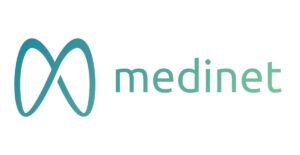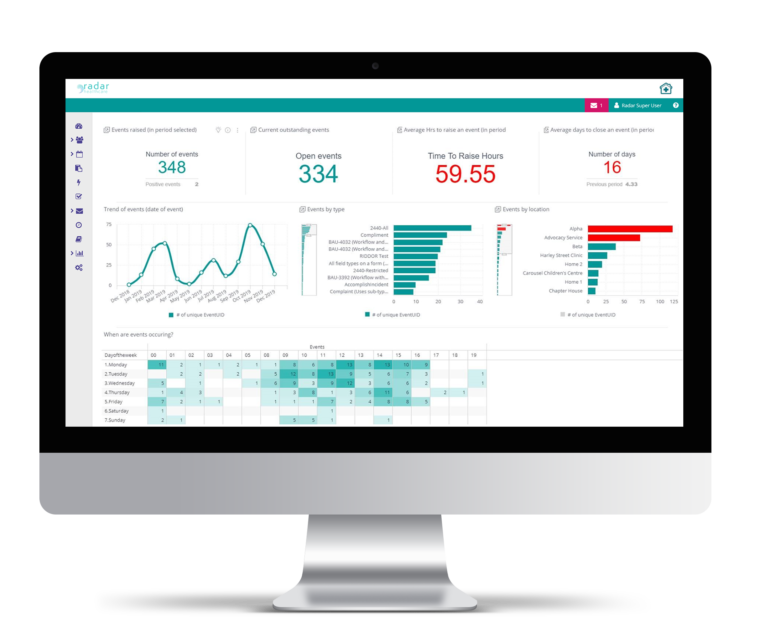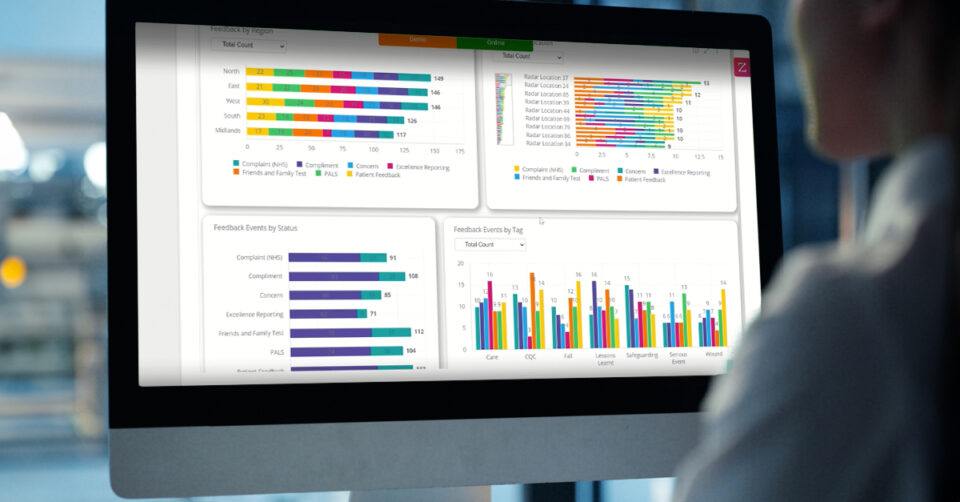
Partnership News
Our partnership with Medinet
Streamlining Governance for Improved Care: Medinet’s Journey with Radar Healthcare
 How Medinet is streamlining their governance processes with Radar Healthcare
How Medinet is streamlining their governance processes with Radar Healthcare
As a leading provider of elective care solutions to the NHS, Medinet has been delivering clinical excellence for over 20 years. Committed to outstanding patient care, they decided to streamline their risk, quality, and compliance processes with digital software to ensure they continue to provide exceptional service.
We recently had the pleasure of speaking with Jordan Webster, Project Manager at Medinet UK about their experience with the implementation of Radar Healthcare.
In this Q&A interview, Jordan discusses the impact of the merger from Remedy Healthcare to Medinet, Radar Healthcare’s implementation process, their experience with this process, and key benefits.
Q. Jordan, can you describe the processes and challenges you faced in managing risk, quality, and compliance before implementing Radar Healthcare?
A. “Before we got Radar Healthcare, we were using another system. We had been using that system for a few years but hadn’t fully utilised its capabilities. Our initial plan was to invest time in optimising it so we could effectively raise tickets, track events, and more. After about a year of development, we reached a stage that we were happy with. However, we did find that even though we’d developed it to a state we were happy with, and it was working how we wanted it to, it was still somewhat limiting to what we really wanted to achieve.
Then with the company’s rapid growth and the merger with Medinet, we now have nearly 200 employees. So, naturally we reached a point where we had maximised what our current system could offer. The limitations of our existing system meant it could no longer support our needs, prompting us to seek a software solution that could scale with our growth.

So, the next steps were choosing a new system, and Radar Healthcare was the right fit. Since then Medinet has transitioned to business as usual, completing the implementation phase of Radar Healthcare. Realistically, we’ve been using the system for almost a year. As Remedy Healthcare, we had used it for about six months before the merger, giving us plenty of experience with the system and the team at Radar Healthcare. Overall, we find it very easy to use at all levels from the governance team to frontline workers.”
Q. Did the merger of the two businesses, Remedy Healthcare and Medinet, have any impact on the implementation process?
A. “While we were still Remedy Healthcare, we integrated Radar Healthcare into our processes, and every staff member had an account and used the system as needed. Then we merged with Medinet. At that point, we decided to pause all development, align our processes, ensure they met the needs of both companies, and update any forms according to best practices.
We spent six months revamping everything to fit the new company structure. This included adding more users, providing additional training, and increasing system visibility. This led to more reviews and updates, creating an ongoing cycle of improvement as we continued to grow

In terms of everything becoming Remedy Healthcare to Medinet, there have been a few challenges, which is as expected. However, in terms of Radar Healthcare specifically, it’s been pretty easy. With users, we can just add new email addresses and change email addresses over to Medinet and we’ve had no issues with that.
What helped us was that we didn’t configure a separate system for Medinet. I think then we would have had some more complications because it would have been starting from scratch again. Obviously, we would have had templates and more experience this time round but by doing it this way and just integrating, it was much better for us. I would recommend any organisation that are in a similar situation to us to do the same thing.”
Q. What’s the implementation process of Radar Healthcare been like for you and your team?
A. “It’s all been pretty seamless, like I said we are really happy with everything that we are doing and are planning to do with Radar Healthcare.
Going back to when we were Remedy Healthcare, there was a lot of work to be done and things took a lot longer simply because we didn’t know the system. As one of the leads of this project I was doing a lot of the actual configuration work and laying down the groundwork to get everything up and running smoothly. Getting to grips with the system was a slow start, as the IT was a very different governance system to what we were using before.
As you can imagine, it was a big adjustment for the company, implementing a new system is never going to be without its challenges, but the support provided by Radar Healthcare has been brilliant. Craig Rainford, Project Manager at Radar Healthcare has been really helpful, and I can’t sing Craig’s praises enough. He’s really helped us through this process and got us to where we are now, which is in a strong position where we are effectively using Events, Risk Register, Document Management, Audits and Scheduled Tasks.
Though we did have a bit of a slow start, the last six months has been a lot quicker because we’re far more familiar with the system. Craig and I have developed a good relationship where we know if we need something we can work together to get it and set realistic time frames and expectations.
I would say overall it’s been really smooth, and all the all the feedback from the Senior Leadership Teams and anyone who interacts with the system is really positive.”
Q. You’ve recently rolled out the Audits module as a pilot across the organisation. Can you tell us a little bit more about that?
A. “Yes. We’ve just rolled out audits as a pilot across the organisation, and so far, we are happy with how this is going.
Originally, this was a module that we had planned to use at Remedy Healthcare, but with the merger coming soon, we decided it would be better to put that on hold so we could do it as Medinet. So, now we’ve just rolled out the first pilots and we were reviewing that in terms of data and then we’ll be looking at the Analytics Builder to do audits in there as well.
The rational for implementing audits next was that it’s something that we’ve needed. This is something we simply couldn’t do in the previous system. Previously, the Governance Team had to do manual paper forms, and as we know, that just isn’t good enough in this day and age. Obviously, when you are working with patients and NHS data, this process needs to be much more streamlined not only to reduce errors and risks, but to save valuable time.
We made the decision to focus on Analytics and the Analytics Builder module first, so that we had somewhere that all our audit and scheduled tasks data could be pulled into. Now we’re really happy with how the pilot has gone, and we only need to make a few small changes.
We are still in the early stages, but Radar Healthcare’s Audit module seems to do be everything we need it to and more. It makes auditing much easier, and we are looking forward to getting these fully rolled out.”
Q. You’ve just mentioned the Analytics module and Analytics Builder. Could you share more about your experience?
A. “Yes. Like I mentioned, recently we rolled out the enhanced Analytics module, which has been great for really understanding our data, collating it in one central location, and helping to make data-driven decisions off the back of that information.
Then we’ve also been using the Analytics Builder, which is something slightly different, as it is much more customisable. So, there’s been a learning curve there for us as a team. However, again support has been amazing. Mark Fewster, Chief Product Officer has been really helpful. He’s jumped on a lot of calls with Ben and I to help show us how to do certain things and answer any of our questions.
On all the demos and training calls, we went into our own system instead of an example or training system, which made things much more relevant and easier to understand and apply. We were impressed by this as a lot of systems don’t typically do this, but it made everything much quicker.

As a result of the support paired with our hard work over the last two months, we’ve developed and pushed out 10 dashboards for the Governance Team, and the response has been fantastic. Everyone is very pleased with the progress and the impact that these dashboards will have.
For instance, we have dashboards for Training, Complaints, Incidents, Concerns, Compliments, Professional Standards, Safety Alerts, Subject Access Requests Legacy Complaints and Legacy Incidents which helps us to manage all areas of the organisation.
The rationale for the Analytics Builder was that we knew Radar Healthcare had default dashboards, but the more custom you make your forms and events, the less relevant those dashboards became to us. With the system we were using before Radar Healthcare there was sort of a report builder. I could make some charts and some graphs and pull some data manually and you could visually display that, but it wasn’t live; it wasn’t dynamic. It was very manual, and you’d have to redo it every month for the teams to use within their reports, so it wasn’t very user friendly and very time consuming. So, like in many organisations we had some ways of getting that data but not really in a in a great way.
One of the key things that we wanted Radar Healthcare for was better visibility of that data, making it more user friendly and also so that we can use it in our board meetings, with the trusts, and with anyone that we speak to and be able to say look here, we can actually show you exactly how everything’s going in a really easy and visual representation. Not only does it help us to quickly understand what’s happening when, it also gives us an extra level of professionalism and looks a lot better than what we have ever used in the past.”
Q. What would you say has been the key benefits of using Radar Healthcare?
A. “Everything that Radar Healthcare offers we had some element of before, but it was far more manual, so the biggest thing for us is time saving. Now everything is all in one central location, meaning that everything is much more accessible and visible to everyone, and no one is duplicating workload. Radar Healthcare has helped us to be more efficient.
Another key benefit would be the access permission controls. This function allows us to control exactly who can see what.

Moreover, if people want to run their own reports, they have their report builder. For raw and trend data, you can pull that too. We can also control the filters the team uses, which is a new and very useful feature for us. This lets us customise dashboards as needed and add some flexibility. For example, the Governance Team might need to review data from the past week or the last 30 days. Instead of separate dashboards for each timeframe, we now have the option to toggle between them. Overall, the Analytics Builder and its dashboards have been one of the biggest and most impactful features for us.
We have rolled out five or six different IT systems for various things over the past year or so, and this is by far the most user friendly, and that reflects on the amount of time or lack of time that I’ve had to put into this versus other systems. So, I would say, it’s been one of the systems we’ve rolled out that we’ve had the least issues from, from a user perspective.
Radar Healthcare has probably been the most successful launch we have had, and we’ve had to relaunch it twice because of the merger. Each time it’s gone really well. Radar Healthcare is a robust and user-friendly system, especially in comparison to what else is on the market.”
Q. Radar Healthcare prides itself on being a partnership-led organisation. You’ve touched on this slightly, but how has your overall experience been with the support offered, everything from day-to-day to training?
A. “Overall, I am really impressed with the level of support offered across the board from Radar Healthcare. I have had conversations and meetings with a lot of the team for various reasons at different stages, but I’ve been predominantly working with Craig Rainford, Project Manager, and Charlie Halshaw, Customer Success Manager on a day-to-day basis.
Craig and I have had weekly meetings for about a year and a half. Within these meetings we’d have project logs, go through actions, any issues or potential blockers, go through any questions, and talk about things that we would like to do and how we can put steps in place to make it happen.

This constant stream of communication has become a really helpful forum to just have a guaranteed hour every week where I could access in-person support from Radar Healthcare – and not only that, but someone I knew and had that relationship with, so I wouldn’t have to explain the situation.
Craig is someone who knows our system, our objectives, and is very technically competent and knowledgeable about the system as well, so he could not only recommend things but action some of the things we needed too. I definitely think that that helped us because it just meant instead of going back and forth on emails, we could just jump on a Teams call or a phone call, which can do so much more than a week of emails. This dynamic really helped speed things up, and I would say that it has been a really positive experience.
In terms of training, Craig has effectively been training me for a year and a half showing me how to do things, telling me how to do things, showing me some systems, and I’ve had various demos right at the start of the process. A lot of these materials become on demand too, so they are always there to look back at and share within the team.
When it comes to formal training, Craig delivered a session to all the Senior Leadership Team and all the people that use Radar Healthcare day-to-day like Managers and frontline workers. We’ve had other sessions where Craig has delivered a presentation, showed us our system. He then put together a presentation for our standard users relating to their interaction with Radar Healthcare and we distributed this to any new users. We have an in-depth training guide that we put together for internal use with the help of Radar Healthcare, and if anyone needs help on an ad hoc basis then Ben or I, as the two with the most experience with the system, will help.
Over the last year, Craig has been our main point of contact, now we have moved into business as usual, we speak with Charlie on a regular basis, but if I do need anything there is always the Support Team too, who I often get good responses from. So, all in Radar Healthcare has an ecosystem of support and resources which is very helpful.”
Thank you, Jordan, for your time and for providing us with all that valuable insight into Medinet’s experience with Radar Healthcare. We are extremely pleased to be working alongside with you and are very excited for what’s in store for this partnership.







